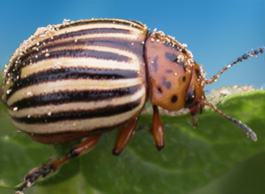Summary
Investigator: Robert Hadad, Cornell Regional Vegetable Program, Lockport, NY
Project location: Four organic farms in upstate New York
Project objectives are:
- To show farmers the benefits of using buckwheat strip as a management tool on their farm;
- To ascertain costs during the project from information provided by the farmers from their past experiences fighting the pest;
- To further quantify the extent to which buckwheat strips will affect beneficial insect control of CPB in a larger plot (than the previous season);
- To develop a field design that will be a template for a strategic approach to managing insect pests;
- To show that using in-season cover crops can provide multi-purpose benefits and be used as part of an active rotation plan.
The objectives of this project will ultimately show the economic importance of a buckwheat cover crop in an organic vegetable crop system. Farmers will learn first hand the intricate interrelationships between cover crops as habitat for beneficial insects and how these beneficial insects play a role in vegetable crop production.

